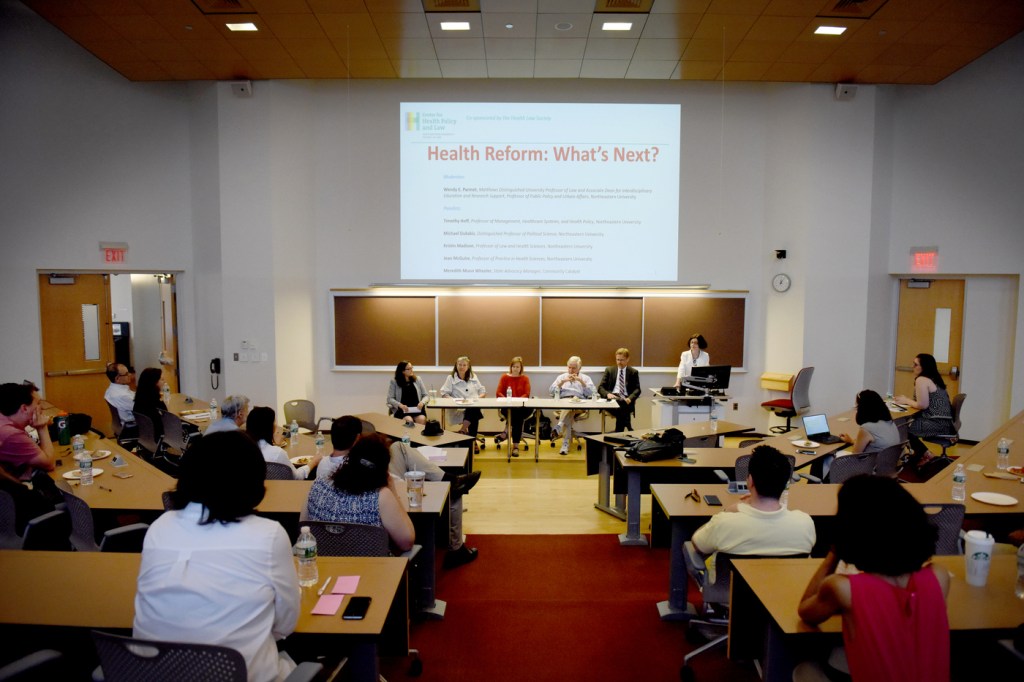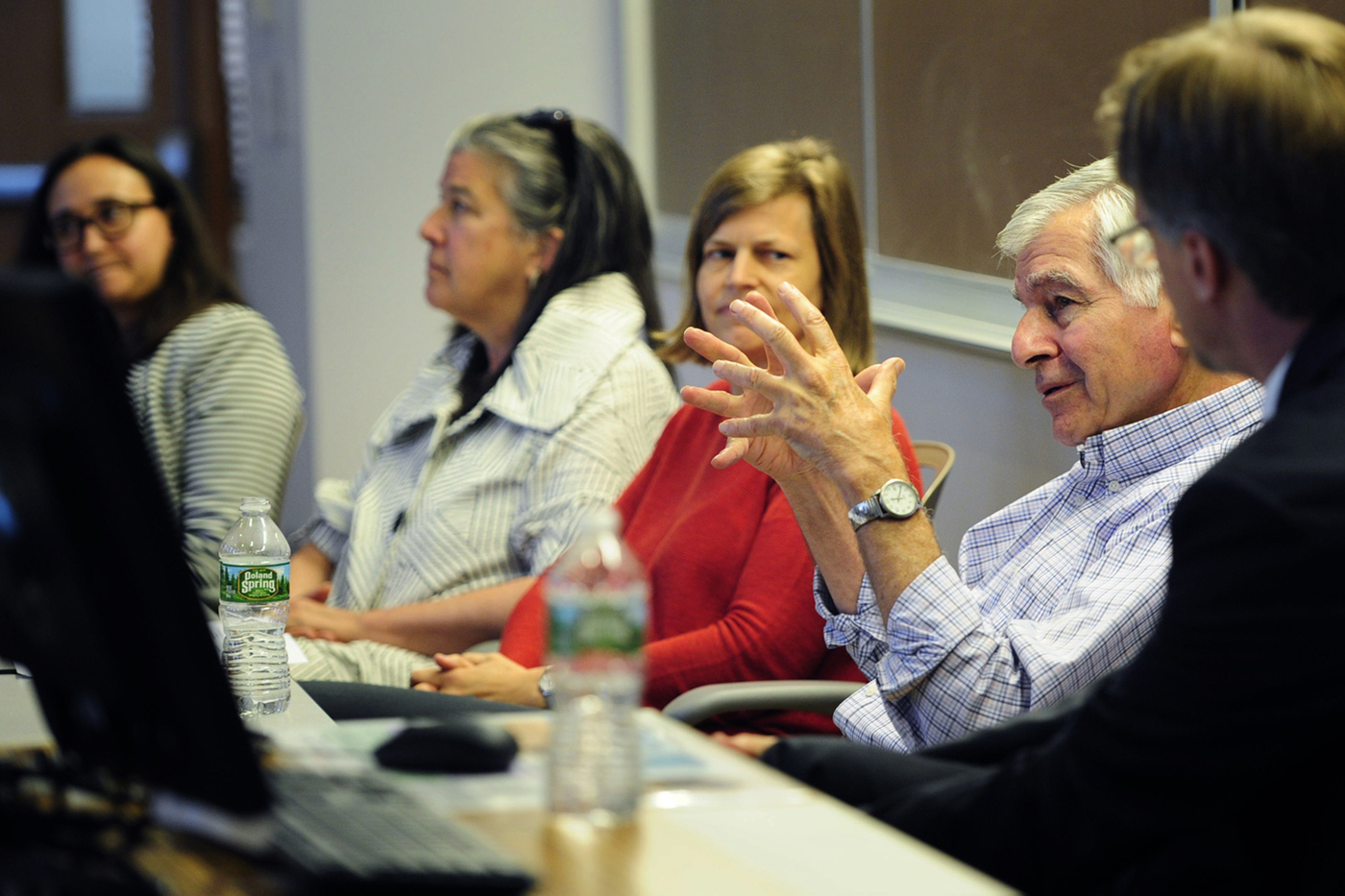What’s next for healthcare reform?

A panel of health, law, and public policy experts from Northeastern and beyond convened on campus on Wednesday afternoon for a town hall meeting on the future of healthcare reform in the U.S., a hot button issue among lawmakers and everyday Americans alike.
The town hall was particularly timely, held as 13 Senate Republicans from 10 states work to draw up a bill that could reshape healthcare for years to come. According to news reports, Senate leaders are looking to put the bill to a vote by the end of next week.
“Whatever happens in Washington in the next couple of days or weeks probably won’t be the end of this story,” Wendy Parmet, Matthews Distinguished University Professor of Law at Northeastern, explained in her opening remarks as moderator of the 90-minute discussion. “Healthcare is complicated,” she added, purposefully invoking the language President Donald Trump has used to describe the nation’s health laws. “It affects everyone at some stage in their lives, particularly at some of our most profound moments.”
The meeting—sponsored in part by the School of Law’s Center for Health Policy and Law—drew dozens of people to 250 Dockser Hall. Talk—among both the panelists as well as a number of faculty and community members in attendance who posed questions—ranged from the skyrocketing costs of healthcare to the political implications of the Republican Party’s forthcoming bill.
Panelist Timothy Hoff, professor of management, healthcare systems, and health policy at Northeastern, provided a big-picture overview of the healthcare industry. He noted several trends, including rising healthcare costs, longer wait times at the doctor’s office, and stark increases in drug overdose deaths. Overdoses, he said, are now the leading cause of death of Americans under 50. As he put it, “The opioid crisis is probably the biggest public health crisis we’re facing now.”
“No matter what happens next,” he added, “something is very wrong with our healthcare system. If nothing gets passed,” he said, referring to the GOP healthcare bill, “I’m not sure what capacity Congress will have to fix what’s wrong with it.”
Panelist Michael Dukakis, Distinguished Professor of Political Science at Northeastern, echoed Hoff, saying that the nation’s bad healthcare system is only going to worsen. As time goes on, he warned, it would get more bureaucratic, more complicated—and more expensive. “It’s clear,” he said, “that healthcare as an issue is looming larger and larger in the consciousness of the American people.”

Michael Dukakis, Distinguished Professor of Political Science, believe that healthcare will be the primary issue of the 2018 midterm elections. Photo by Matthew Modoono/Northeastern University
Dukakis, who won the Democratic nomination for president in 1988, questioned the Democratic approach to solving the healthcare crisis today. “This is all about working Americans and families getting decent, affordable health insurance,” he said, “and it’s an argument that the Democrats aren’t making.”
Panelist Meredith Munn Wheeler, of Community Catalyst, a Boston-based healthcare advocacy group, is no stranger to arguing in favor of healthcare coverage for all. In particular, Wheeler has been working to close the Medicaid coverage gap, providing strategic guidance and policy support to advocates in states that have opted out of the Medicaid expansion under President Barack Obama’s healthcare law.
“We provide resources to politicians about how to work to defend the healthcare system we have and to prevent it from being crumpled up and thrown away,” she explained.
The senate’s impending healthcare bill, she said, “is really bad news for people,” potentially leading to a “fundamental restructuring of the Medicaid program that could not be undone.” Her mission between now and next Thursday, when the GOP bill is expected to reach the senate floor, is to “blast the narrative as hard and as often as possible that this bill is terrible for working people.”
During the Q&A, Parmet asked the panel why we haven’t seen more TV and radio campaigns in support of sensible healthcare reform. Hoff was unequivocal in his reply, saying, “We don’t see a lot of response from industry because its bought and paid for. It’s depressing and disappointing, but it doesn’t surprise me.”
One attendee, Northeastern law professor Brook Baker, wanted to know how the sharp rise in prescription drug prices might factor into the legislative debate over healthcare. Panelist Jean McGuire, professor of the practice in health sciences, who has more than 30 years of experience in local, state, and national public health and disability policy development, did not think that the affordability of prescription drugs would resonate with those on either side of the argument. “Using pharmaceutical affordability as a strategy in the fight that’s going on now just doesn’t seem to have any traction to me,” she said.
Another attendee, a self-described activist in the local community, said the senate bill would do more to benefit the rich than the poor or working class. She wanted to know how the bill, if passed and signed into law, would impact the 2018 midterm elections. Wheeler wasn’t sure healthcare would be the primary issue of election season, saying that “it’s up to us to make that happen if we feel healthcare is important.” Dukakis disagreed. “Democrats in Congress think healthcare will be the No. 1 issue,” he said, noting that he’s chatted with many of them who have told him so.





